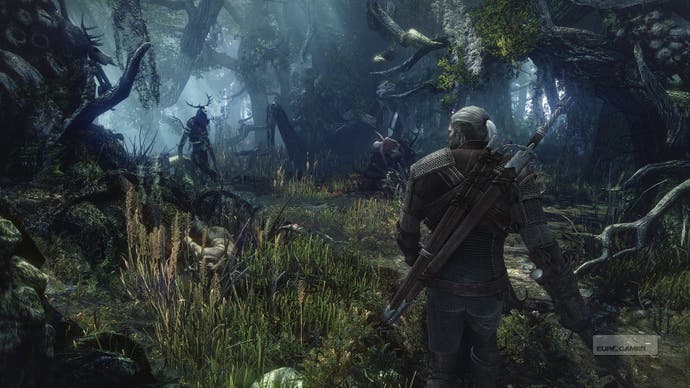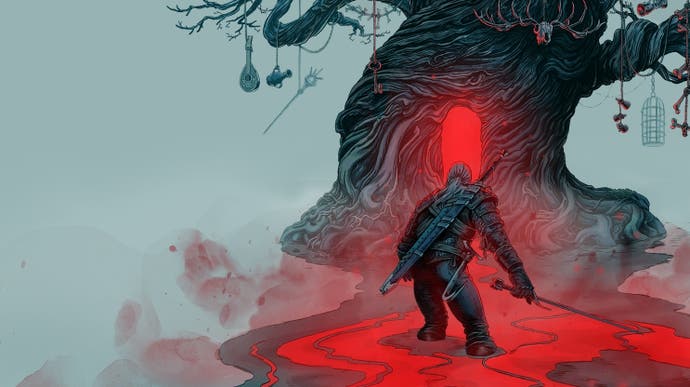What The Witcher 3 got right
The witching hours.
Recently - I say recently, it was before lockdown, so a lifetime and a half ago - I started a new game of The Witcher 3 from scratch. Not because of the Switch port; as impressive as that is, this is a big-screen game for me. A little bit because the Netflix series had pushed the game, which celebrates its fifth anniversary today, to the front of the public consciousness and so into mine. Mostly because there was nothing new I fancied playing, or rather I fancied playing nothing new - I wanted the soothing feeling of old routines, patterns of thought and movement worn smooth with use. I wanted to go on a quest and upgrade my armour, and quest again and upgrade again, like I did five summers ago. I wanted to be weak and become strong, to be drab and become stylish, to be simple and become sophisticated. I wanted a comfort game.
What I have found is a game that is just as I remembered it - of course it is, I know a lot has happened, but five years still isn't that long ago. I still love it, but I don't love it for quite the reasons I thought I did. Those are not the things that drew me back in, and certainly not the things that have kept hold of me.
I had grown accustomed to thinking of The Witcher 3 as a masterpiece of world-building and storytelling hung on a serviceable, not to say mediocre action-RPG framework. The combat was a little sluggish and lacking in refinement, perhaps, and it never seemed to matter much where you invested your skill points. The consensus - which I hardly disagreed with - had it that the game's greatest achievements were its rich, humane tapestry of questlines and the lived-in texture of its landscapes; its portrayal of a messy, complicated medieval world that was past redemption.
This isn't wrong. But playing the game a second time, I can't say I find myself as enthralled by the writing as I was. My thumb taps restlessly on the dialogue skip button. The script has its grace notes, for sure, and I still admire its emphasis on telling stories on a small, human scale within its grand fantasy setting - the way it has the confidence to lead with the private struggles and intrigues of even incidental characters, knowing they make far more interesting motivation than any magic MacGuffin. But in the harsh light of hindsight it's uncomfortable how often the writers' stabs at bitter-little-pill realism - a sort of kitchen-sink Tolkien - tip over into edgy nihilism for nihilsm's sake. It's harder, now, to forgive the sudden lurches in tone, the often wooden comedy, the dreadfully paced, talky midsection and the excruciatingly unsexy romantic scenes. I still wouldn't call it bad, far from it. But the art of video game storytelling is growing up fast, and from some angles the Witcher 3 comes across as quite the awkward adolescent, its voice bouncing up and down the octaves.
I do still love Geralt, even though he is dangerously close to being a parody of the gruff, masculine video game hero. It might be because he's adapted from a character with a lot of literary miles under his belt, or because this was the third time voice actor Doug Cockle and the writers had slipped into his skin and they were getting comfortable; either way, his grumpy, gravelly stoicism has a fondly self-mocking edge that I can't help but warm to. He's like a mid-period Clint Eastwood performance, around the time of Unforgiven - aware of the one-dimensionality of his macho shtick and playing a surprisingly subtle, almost subversive tune on it.
If I have fresh insight into the game now, it's this: it really is all about Geralt. Not just the character as written, the lines, the performance. Not just the iconic character design, so heavily leaned on by Henry Cavill and the producers of the Netflix show: the distinguished white mane, the understated menace of the armour, the practical bearing, the wary swagger. It's everything about being that character in that world - up to and including those imperfect combat and role-playing mechanics.

It's a question of specificity. The Witcher 3 is a game about being a witcher, and that's not something that even exists in any other game or fictional universe. It is a highly specialised fantasy of monster-hunting: tough, athletic, only modestly super-powered; cautious, well-prepared and professional, sometimes to a fault; singular but cursed and regarded with suspicion; a chivalrous mercenary, a handsome freak, someone who walks apart. CD Projekt's true genius is that everything, but everything in the game bends towards delivering this uniquely flavoured fantasy to the player. It's intoxicating.
Yes, the combat is unresponsive and the skill trees a little undercooked, but playing the game on Death March difficulty I appreciate how fully I have to enter this highly specific mindset: doing my monster research, preparing for each fight, watching the tells to time a life-or-death dodge; choosing not between tank and glass cannon archetypes but between athlete, strongman and technician. I understand why the different builds change the feel of the game significantly but not completely, because if it changed too much, it wouldn't be about a witcher any more.
I enjoy the side quests more than the main quests, but I enjoy the contracts much more still. Each of these delivers a perfectly formed half-hour of adventure, another monster-of-the-week episode in your friendly neighbourhood witcher show. A little exposition, a little sad folkloric metaphor, a little exploration and preparation, a climactic fight, then collect payment, saddle up and riddle into the sunset. And I love the scavenger hunts for crafting schematics for witcher gear that seem to write themselves organically into the landscape, telling tales of witchers past and leading you on adventures that feel spontaneous, yet have a satisfying beginning, middle and end.
When I'm discussing plans for the evening's relaxation with my wife, I might say to her, "I think I'll do a little witching tonight." It's our little joke about the silly-sounding, archaic verb that gives the game its title. But it's not a joke, not really, because when I play The Witcher 3, I am fully role-playing, rehearsing a part I could never even have dreamed of myself. The game has bent me to its will. This is not the kind of role-playing game that lets you be whatever you want to be; this is the kind that puts a character before you and makes you want to be nothing and nobody else.


